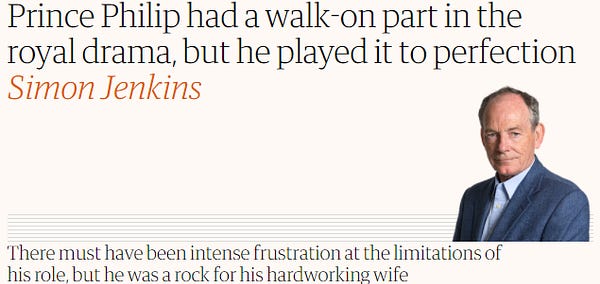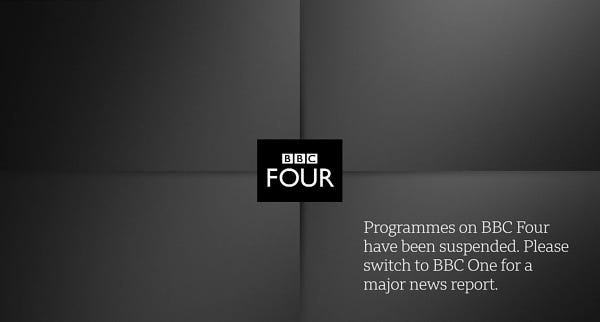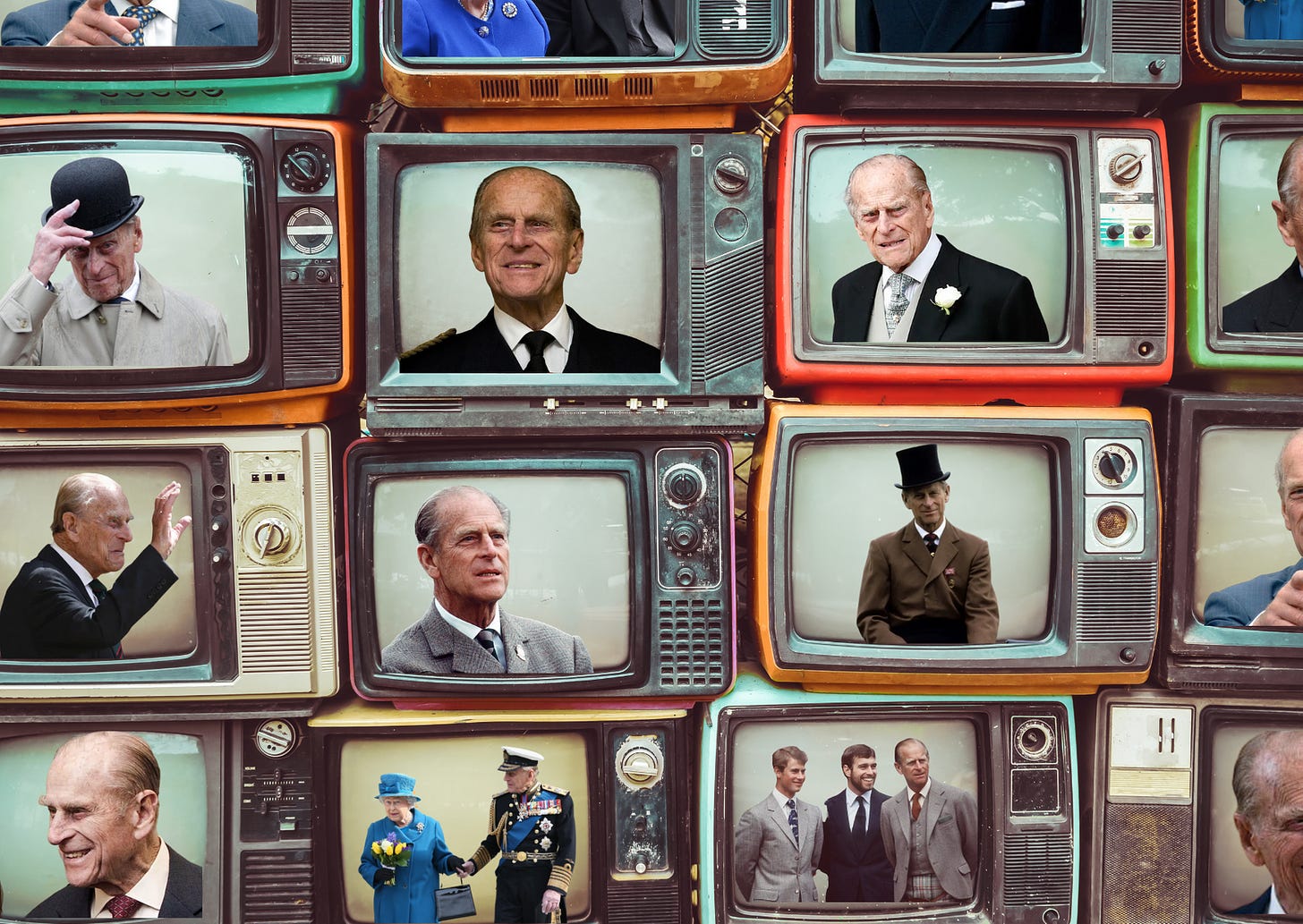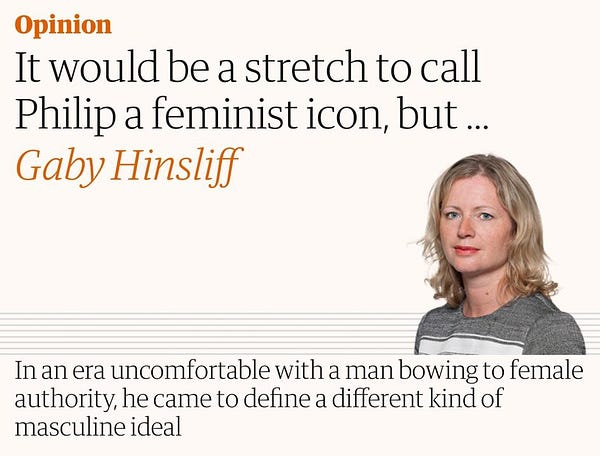Not waving, but crowning: The coverage of Prince Philip's death shows the diseased state of the British media
North Korea broadcasters will have looked on in envy.
I must confess that I am tempted to ask for reincarnation as a particularly deadly virus, but that is perhaps going too far…
— Prince Philip in the foreword to People As Animals (1986)
I’m meant to say I’m thinking of the Queen, that I’m mourning Prince Philip and that the UK has ‘lost a great public servant’. But I’m not thinking or feeling any of those things. Prince Philip was 99 years old and died after a long life of privilege, palaces, and poorly pretending to be interested in other people.
We are still consistently told that the Queen is special — a magisterial other — with her humanity obscured and obfuscated by the smoke and mirrors of monarchy. Acting as though we know about her humanity is like pretending we can understand the inner life of a dragon or a unicorn’s anxiety disorder.


There were largely well-intentioned warnings across social media yesterday about saying anything that might draw the Sauron-like attention of The Daily Mail. You were better off staying silent than uttering even a single word of dissent about the complete mobilisation of the British media in obsequious remembrance of a man you didn’t know and who give not even a scintilla of a shit about your existence.
Seeing electronic billboards across Britain hijacked with HRH’s face, while the airwaves filled with dewy-eyed remembrances from hangers-on of all stripes was not comforting but disturbing.


It had the air of dystopia seeping through the cracks in a society that largely play-acts as a democracy. Every single BBC radio and TV station turned itself to coverage of the Duke’s death, aside from CBBC and CBeebies which plastered the screen with a black banner encouraging adult viewers to switch to BBC One.
The BBC’s Royal Correspondent, Nicholas Witchell, recounted the time that Prince Philip warned British students — during the first and only state visit to China — that if they stayed much longer they would “all be slitty-eyed”, as an example of one of the royal’s ‘gaffes’. He was just one of many reporters who participated in yesterday’s wholesale gaslighting effort to frame an often abrasive and racist man as a kind-hearted public servant.
Often the rhetoric went even further. We were told that the Duke would have made a “great CEO of a FTSE100 company”, was a “towering intellect”, “a great wit” and an “accomplished author” having written two books about theology once. ITV News went even further, telling its viewers that he was “a Greek god”. Well, I suppose Hades was a god…
The endless coverage of a single fact news story — the Duke of Edinburgh had died — became so thin as the day went on that it was like watching someone trying to spread a tiny pat of butter across an entire loaf of bread.

Time and time again the packages on TV and radio referred to the Duke as an “icon of service”, perpetuating the myth that the Royal Family plays its part in public life not because it wishes to maintain its prestige and power but because it really is full of humble servants who just happen to need a load actual servants to do even the most basic things for them.
When the coverage turned to ‘how much Prince Philip meant to the public’, the thin veneer of ‘reporting’ cracked to reveal the pure propaganda beneath it. As is so often the case, the editors knew the angle they wanted and went out to get it. To put a dissenting voice into their packages would bring down the demonic force of the Daily Mail, so instead, they spoke to the ‘distraught’ and the simple desperate to be on the news.
Consuming the British media during this buffet of bootlicking is like being a bystander in the story of the emperor’s new clothes. Only in this case, you’re expected to not only ignore the emperor’s nakedness but also forbidden from mentioning that his cock’s got racial slurs scrawled all over it.
To experience every newspaper — from broadsheets to wank rags — turning into Majesty magazine but with even less objectivity is a queasy experience. There was a time when The Independent affected to be a republican paper, unbothered by royal stories, but under the ownership of Baron Lebedev, of Hampton and Siberia, it’s as desperate to stay in line with the establishment as any of its rivals.


With years to prepare for Prince Philip’s passing, the papers were able to press the button and swamp their homepages with enormous amounts of content — from obits to photo galleries to analysis and explainers. But the real competition was for which title could produce the most unhinged comment piece.
Simon Jenkins in The Guardian was quickest off the mark with a piece of boot cleaning obsequiousness which could quite easily have been dropped into The Daily Telegraph. Under the headline, Prince Philip had a walk-on part in the royal drama, but he played it to perfection, he concludes:
Philip’s person was integral to that phenomenon. He wandered the globe, supporting his wife in a job of mind-numbing dullness. There were no scandalous liaisons, no dodgy business associates, no absences or public distancing from court. He seemed genuinely to love the Queen and she him, though their love seemed strangely undemonstrative. He was simply there, a rock for a hard-working wife, a rather modern sort of man.
There is a difference between there being “no scandalous liaisons” and never getting caught. Rumours of the Duke of Edinburgh’s extra-marital interests were all over the place in the 1950s but the firm worked hard to dismiss, dismantle and distract from those claims.
And the constant references to the Royals’ “hard work” are just another sign of how successful the family has been in pushing the idea; a propaganda success that Prince Philip — who first let TV cameras into the monarchy’s bubble — played a central role in achieving.
The ludicrous idea of the Duke of Edinburgh as a kind of highly expensive house husband was replicated in another Guardian opinion piece published later in the day by Gaby Hinsliff. Beneath the updated headline Standing behind his wife, Philip defined a different kind of masculine ideal — the original read “It would be a stretch to call Philip a feminist icon but…” — Hinsliff writes:
Like Denis Thatcher after him, another forceful man married to a more powerful woman, it would be a stretch to call the duke a feminist icon merely because his marriage turned traditional gender roles upside down. It was perhaps the crown, as much as the woman wearing it, to which this scion of the exiled Greek royal family deferred; the crown to which he famously pledged allegiance by kneeling before his wife at her coronation…
… [He came] to define a different kind of masculine ideal; one rooted in devotion, support and the kind of strength that does not need to show itself by muscling endlessly into the limelight… his real function in public life was having the grace to fade into the background of it and allow his spouse the spotlight, as the wives but more rarely the husbands of public figures had previously done for so long.
In the long list of adjectives you might apply to the Duke of Edinburgh, ‘grace’ shouldn’t be in the first hundred. And given that he successfully pushed the Queen to add his anglicised surname to the family name and demanded control of matters within the firm like where Prince Charles went to school, the idea of him as some shrinking subordinate to his wife is more than fanciful.


Of course, Hinsliff is far too hinged to compete with the true titans of talking absolute toss for money. Allison Pearson was released from the hyperbaric chamber where she rests like Lord Vader to deliver a masterclass in mournful slobbering — The Queen has lost her protector, but everything they built together lives on.
Pearson, who memorably and vomit-inducingly wrote that Boris Johnson’s health was “the health of the nation” when the Prime Minister was hospitalised with Covid-19, really pulls out the stops in this one. She begins, after checking that her eyeliner has run in an appropriately dramatic (and respectful!) manner:
If you surprised yourself by shedding a tear – as millions of us did – when you heard that Prince Philip was gone, no small part of that sadness will have been for his widow, our Queen and his beloved wife.
In 62 days, Her Majesty would have been able to send the Duke of Edinburgh a telegram for his 100th birthday. That would have amused them both. (They never stopped laughing together.) If he could possibly have hung on to give her that satisfaction, you just know that he would. For that was his job, always and until his final breath. He was her champion, “my strength and stay all these years,” the Queen called him on their Golden Wedding anniversary. Who will be there for her now he is gone?
The British press loves to write about the Royal family as if they are literally everyone’s family rather than a group of aristocrats enabled in their position by a bizarre collective belief in a magic vagina. Pearson takes that to the nth degree, by writing as if she regularly stood in the corner of Phil and Liz’s living room, silently staring, while they watched Countdown.
And “who will be there for her now he is gone?” Well, her many children — including her favourite, the one who palled around with the paedophile — and a vast army of servants which caters for her every need.
Pearson ends her piece with some GCSE Drama-style theatrics…
Today, as we mourn a great and irreplaceable national character, we may half-fear that this is but a dress rehearsal for the sorrow we will feel when we lose our Queen. Not yet, please, not that, not yet. Her champion and protector is gone, but everything they built together lives on.
… which suggests, contrary to what she says, she can’t wait to wail and gnash her teeth when the Queen goes, well aware she’ll get weeks of copy out of it.
Pearson should watch her back though as a young pretender for The Telegraph’s most cringe-worthy columnist crown is limbering up. Madeline Grant comes in strong with her piece — To me, Prince Philip was the nation’s grandfather — which aims to tug at the readers’ heartstrings with all the care and attention of a 10-year-old given a violin for the first time.
[Please look under your seat now and retrieve your Conquest of the Useless branded sick bag before reading on.]
Grant writes:
British people will mourn him differently. To older generations, he wasn’t just the Queen’s distinguished consort but the dashing polo-playing pin-up; who in youth landed somewhere between Lawrence of Arabia and Errol Flynn. Even the gorgeous Matt Smith in The Crown wasn’t quite handsome enough to do justice to the young Duke of Edinburgh… To younger generations it feels as if we’ve lost our nation’s grandfather.
Yes, my grandfather also looked quite dashing when he was younger and says racist things at the most inappropriate moments.
But Grant isn’t done yet:
The Duke of Edinburgh wasn’t just the Queen’s indispensable companion and helpmate, or a beloved (though straight-talking) father and grandfather; he was our Prince of Banter. He could always be relied upon to puncture pomposity and reduce the tension of stressful official engagements – “I declare this thing open, whatever it is”, he blithely announced during one tour of Canada.
Ah, yes, Philip, Prince of Banter, always ready to head out for a cheeky Nandos and the chance to comment on Portuguese people’s lack of work ethic or search for a fusebox that he could suggest looked “like it was put in by Indians”.
Grant goes on to claim that it was the thought of meeting Prince Philip that spurred her on to complete her Duke of Edinburgh gold award and concludes:
Instead of erupting into lamentation, I suspect that he’d have wanted the nation to rally behind the Queen – always his number one priority – pull ourselves together and keep buggering on.
Madeline Grant is 29 years old but cosplays as middle-aged for Telegraph readers. She’s got a job for life.
Our final contestant in today’s review of the bootlicking bacchanal is Dan Wootton, a candidate for not only worst person in the British media but worst person with access to a copy of Microsoft Word. Now nestled snuggly at The Daily Mail and awaiting his GB News debut, desperate Dan inevitably turns his attention to Meghan at this time of mourning and opportunism:
The dramatic fallout sparked by Prince Harry and Meghan’s incendiary and ill-timed interview with Oprah Winfrey must be put to one side.
Prince Charles, William and Harry need to put on a united front for the Queen and country, securing the international reputation of the monarchy.
The public will also have to accept the presence of scandal-plagued Prince Andrew, who remains a key confidante of his mother.
Describing Prince Andrew as merely “scandal-plagued” — as if he’s the least popular member of a boyband — is like rating Harold Shipman’s record of patient care as “patchy”.
But putting that aside, it’s clear that Wootton and his malignant mates at the Mail are just gearing up to make Meghan the ‘real’ cause of Prince Philip’s demise rather than the unavoidable fact that he was ancient. After all, it only took a few hours for Fox News to blame the Duchess of Sussex.

The media madness highlighted by the coverage of Prince Philip’s death is only going to grow as it continues across the weekend. Mere minutes into the BBC’s reporting on the story yesterday, Evan Davis was already reduced to murmuring, “To think, he was the first royal to ever fly in a helicopter.” The current waves of bibble will grow into a tsunami of total toss.

We have had the excessive coverage but we’ll also have the attacks on Channel 4 for not changing its schedule beyond an obit and an extended Channel 4 News edition. There’ll be the packs of hacks hunting through social media to find the disrespectful tweets and even the ones from young people who knew absolutely nothing about Prince Philip.
And there’ll be the backlash to the backlash questioning how anyone could possibly object to such blanket coverage of this ‘beloved’ figure passing. That particular strand will focus on the Duke as a war hero and ask why the Left — oh yes, it’ll be the Left that’s to blame — don’t respect ‘our boys’.
But who gets to be called a ‘war hero’ and why is a big mess in itself. Prince Philip’s war record is so well picked over because the Queen picked him to marry. In many families, there are stories of people who did extraordinary things during the war and since, but they didn’t have the great fortune to emerge from a magic vagina so their histories are not nearly as interesting.
The British media has gone into overdrive on this story because it is a protection racket combined with a circular firing squad. No one wants to be seen as insufficiently deferential, no one wants to be the one hounded by The Daily Mail because they weren’t wearing a black-tie or didn’t look appropriately distraught.

A senior broadcast journalist put it well last night when they told me:
If we genuinely were concerned with The News we wouldn’t be covering the story in the way that we are. The wearing of black signals a “respect” that no actual journalist would wish to grant to any figure in the news, let alone the aristocratic husband of a hereditary head of state
That’s a view held by a lot of people in the media but the protection racket holds, as does the myth-making, and the dangerous combination of arse-kissing and arse-covering. If more people started asking questions about the role the monarchy plays in our country, where would it stop? Politics? The media? For most people in power — whether they’re editors or MPs — that’s not something that even bears thinking about.





